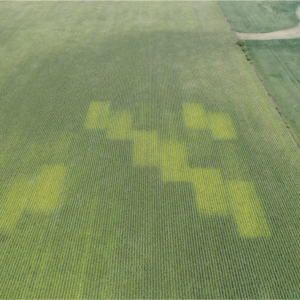Nitrogen stabilizers and nitrogen research to be the focus of a Central Iowa Field Day
With nitrogen prices increasing over the past few years, growers have their minds squarely on fertilizer costs. Throw into the mix weather volatility (what else is new?), and farmers are more scrupulous than ever before when it comes to nutrients – and for good reason. But perhaps a better consideration for growers is how to maximize the efficiency of the nitrogen they do put down.
Not only does this make sense financially, but it’s an important strategy for water quality. The last thing farmers want is to lose nitrogen downstream.

In other words, it’s not so much about not using nitrogen, but more about using it effectively.
This is the focus of an August 23 field day in Guthrie Center, hosted by Verdesian to educate about nutrient efficiency.
The Nitrogen Initiative
Also in the spotlight at the field day is a research project called the Iowa Nitrogen Initiative. Dr. Mike Castellano at Iowa State University is leading the project to provide more accurate nitrogen recommendations to farmers.
Castellano and his team are recruiting farmers across the state to participate in on-farm research using different nitrogen rates. It’s easy to sign up – all farmers need is access to is precision application technology. The test plots are small and controlled.
Castellano hopes to not only collect hundreds of scientifically robust rate trials, but also develop a forecasting cool, hindcasting tool, and develop more specific nitrogen recommendations than those that currently exist.
“There are challenging pressures on farmers to fertilize at the right rate in every field, every year for productivity and the environment,” says Dr. Castellano. “If they hit the sweet spot, it’s the best outcome for economics and environment.”
If you’d like to learn more about the trials and inquire about participating, click here or reach out to Melissa Miller at millerms@iastate.edu.
Stabilizers and the 4Rs of nutrient management
Of the “Big 3” of macronutrients, nitrogen (N) is easily the most important. It is, in many cases, the third most impactful investment a farmer will make in a year. Crops need N to ensure they are healthy during growth, but also that the crops provide nutritious sustenance once harvested and picked.
In short, we need fertilizer. But we can also decrease the amount we are using to cut down on the N2O output – while still having high-performing yields. We can do this by enhancing our nitrogen fertilizer. Products like Trident, N-Charge G, NutriSphere-N and others stabilize that N fertilizer, thus reducing emissions and enabling that reduction with no yield impact. In other words, these technologies enable producers to grow more food – and sustainably.
Beyond stabilizers, the tried-and-true 4Rs of nutrient management still hold sway as well.
The goal, according to nutrient use efficiency leaders, is to limit the impact on yield potential while also increasing the impact on reduction of nitrogen oxide release. Regulatory and consumer pressure will continue to be more prominent in the next few years – not decades.
“As in-seasonal applications of nitrogen continue, based on local weather conditions, it is still an important value consideration to add a nitrogen stabilizer,” adds Ahrenholtz. “The goal is to minimize nitrogen loss to the environment while maximizing nitrogen efficiency, maintaining its availability, and increasing its uptake by the growing crop.”
Media Relations
Lindsey Robinson
Marketing Operations Manager

